Search Results
Showing results 621 to 640 of 2059

Open Heart: Virtual Bypass Surgery
Source Institutions
In this online activity about heart disease, learners will, with the virtual help of an actual surgeon, watch a virtual bypass surgery.
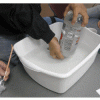
Inflate-a-mole
Source Institutions
In this activity, learners conduct an experiment to find the volume of one mole of gas. Learners capture sublimated gas from dry ice in a ziploc bag and use water displacement to measure its volume.

Cheese: Behold the Power of Chemistry
Source Institutions
In this activity on page 7 of the PDF (Get Cooking With Chemistry), learners conduct an experiment to get an idea of how cheese is made.
Why is the Sky Blue?
Source Institutions
In this activity, learners create a "mini sky" in a glass of water in a dark room.

Clogged Arteries
Source Institutions
In this activity, learners explore how eating unhealthy food can damage a heart and arteries.
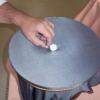
Gravity and Falling
Source Institutions
This fun and simple hands-on astronomy activity lets learners experiment with a bucket, stretchy fabric, marbles, and weights to discover some basics about gravity.

Make Your Own Sea Otter
Source Institutions
In this activity about sea otters, learners make their own "otter whiskers" and use them to find objects underwater.

Metal Noise Maker
Source Institutions
In this activity, learners explore how sound travels through solid objects better than through air. Leaners attach a metal clothes hanger to a piece of string and hold it to their ears.
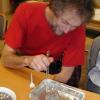
Electrostatic Water Attraction
Source Institutions
In this activity, learners conduct a simple experiment to see how electrically charged things like plastic attract electrically neutral things like water.

Fly a Hot-Air Balloon
Source Institutions
Learners assemble a hot-air balloon from tissue paper. The heated air (from a heat gun) inside the balloon is less dense than the surrounding air and causes the balloon to float.
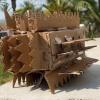
Biomimicry Mash-Up
Source Institutions
In this design challenge activity, learners explore the concept of biomimicry by using a natural organism's special features to design a new human object.

How Do We Find Planets Around Other Stars?
Source Institutions
This fun and simple hands-on astronomy activity describes techniques scientists use to find planets orbiting other stars.

Postcards from Space
Source Institutions
Using information from the My Place in Space lithograph, learners write and/or draw a postcard to friends and family as if they had gone beyond the interstellar boundary of our Solar System, into the

Playground Patterns of Cracks
Source Institutions
In this math activity, learners observe and sketch cracking patterns in pavement.
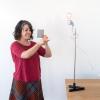
Polarized Sunglasses
Source Institutions
In this activity, learners explore how polarizing sunglasses can help diminish road glare.

Making a Translation Tessellation
Source Institutions
In this activity, learners slide shapes to create unusual tiled patterns.

Whale Cart
Source Institutions
In this activity, learners interact with whale artifacts such as replicas of skulls, bones, teeth, and baleen (hair-like plates that form a feeding filter).
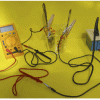
Cake by Conduction
Source Institutions
In this demonstration, cook a cake using the heat produced when the cake batter conducts an electric current.

Zoomers
Source Institutions
In this activity, learners build their own rockets from paper, coffee stirrers, and tape. Learners discover that when anything flies, air pressure is always involved.
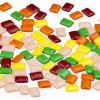
Does Your Chewing Gum Lose Its Flavor?
Source Institutions
Each learner chews a piece of gum until it loses its flavor, and then leaves the gum to dry for several days.
